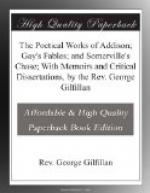From life’s superfluous cares enlarged,
His debt of human toil discharged,
Here Cowley lies! beneath this shed,
To every worldly interest dead;
With decent poverty content,
His hours of ease not idly spent;
To fortune’s goods a foe profess’d,
And hating wealth by all caress’d.
’Tis true he’s dead; for oh!
how small
A spot of earth is now his all:
10
Oh! wish that earth may lightly lay,
And every care be far away;
Bring flowers; the short-lived roses bring,
To life deceased, fit offering:
And sweets around the poet strow,
Whilst yet with life his ashes glow.
PROLOGUE TO THE TENDER HUSBAND.[8]
SPOKEN BY MR WILKS.
In the first rise and infancy of Farce,
When fools were many, and when plays were
scarce,
The raw, unpractised authors could, with
ease,
A young and unexperienced audience please:
No single character had e’er been
shown,
But the whole herd of fops was all their
own;
Rich in originals, they set to view,
In every piece, a coxcomb that was new.
But now our British
theatre can boast
Drolls of all kinds, a vast, unthinking
host!
10
Fruitful of folly and of vice, it shows
Cuckolds, and cits, and bawds, and pimps,
and beaux;
Rough country knights are found of every
shire;
Of every fashion gentle fops appear;
And punks of different characters we meet,
As frequent on the stage as in the pit.
Our modern wits are forced to pick and
cull,
And here and there by chance glean up
a fool:
Long ere they find the necessary spark,
They search the town, and beat about the
Park;
20
To all his most frequented haunts resort,
Oft dog him to the ring, and oft to court,
As love of pleasure or of place invites;
And sometimes catch him taking snuff at
White’s.
Howe’er, to do
you right, the present age
Breeds very hopeful monsters for the stage;
That scorn the paths their dull forefathers
trod,
And wont be blockheads in the common road.
Do but survey this crowded house to-night:—
Here’s still encouragement for those
that write.
30
Our author, to divert
his friends to-day,
Stocks with variety of fools his play;
And that there may be something gay and
new,
Two ladies-errant has exposed to view:
The first a damsel, travelled in romance;
The t’other more refined; she comes
from France:
Rescue, like courteous knights, the nymph
from danger;
And kindly treat, like well-bred men,
the stranger.
EPILOGUE TO THE BRITISH
ENCHANTERS.[9]




